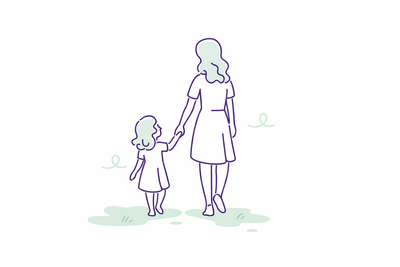
When I first started learning about Montessori, the only blogs I found where from American mums who had brought Montessori into their homes. It might sound funny, but because they were so far away both physically and culturally (for not living in Europe), it felt so difficult for me to follow in their footsteps.
And then I found Cristina Tébar, a young Spanish mum raising her children the Montessori way here in Spain. Her blog Montessori en Casa taught me that Montessori is accessible to everybody and doesn’t cost anything; you only need to want to commit and maybe be willing to go against the flow.
Also thanks to Cristina, Oliver will be raised Montessori. And that’s why today I’m happy x2: for having on La Tela somebody that I deeply appreciate and for been able to share her words with my readers. Thanks, Cristina :-)
Today Montessori is a big part of your life at home and at work, with your blog. But how did you get to know the Montessori philosophy?
I started finding out about Montessori on Pinterest and on different foreign blogs, and then I read all the books from Maria Montessori and other authors that I found, and as I wanted to introduce my son to the Montessori philosophy at home, I decided to take one more step and get certified for the stage 3 to 6 years old. Now my son is 5 and a half so I’ll have to keep advancing, and I started studying for the stage 6 to 12 years old.
Just recently you launched a new course on the Montessori en Casa virtual classroom. Why are you offering it for free, unlike the other courses?
I wanted to offer an introductory course for free so people could learn how the virtual classroom works, and at the same time make the Montessori basic principles available to everyone. Many people believe that Montessori is only for rich people, but it’s really not true: maybe the materials are somewhat expensive, but bringing the philosophy into your life is free, it does’t cost a nickel, the only thing you need is to want to do it.
If you had to give just one reason why we should bring Montessori to our homes, what would that be?
In just one sentence: Montessori teaches peace and respect. I don’t think anybody can be against those values.
Sometimes, starting something as important as Montessori (which means revolutionise our lives and go against the flow) seems a mission impossible. If one wanted to first tiptoe into the Montessori philosophy, what are the small things to start with?
First, we have to change our attitude as adults, and to do so you have to deeply understand the Montessori philosophy to see what we’ve been doing and what we should change. Many people start by buying materials without taking the time to understand the Montessori philosophy. That’s a mistake. It’s like starting to build the house from the roof. The philosophy without the materials works, but the materials without the philosophy don’t.
“The philosophy without the materials works, but the materials without the philosophy don’t.”
Tweet// <![CDATA[!function(d,s,id){var js,fjs=d.getElementsByTagName(s)[0],p=/^http:/.test(d.location)?'http':'https';if(!d.getElementById(id)){js=d.createElement(s);js.id=id;js.src=p+'://platform.twitter.com/widgets.js';fjs.parentNode.insertBefore(js,fjs);}}(document, 'script', 'twitter-wjs');// ]]>
To the skeptic ones who dismiss the Montessori philosophy saying things like, “I have been raised without Montessori and I’m perfectly fine, Montessori is just a fashion now”… what would you say?
I’d ask them if they think they are really as fine as they could be and, most important, if they think our society is fine. Honestly, I don’t think so; there are many things we could improve both as individuals and as society.
And for those who are already following the Montessori philosophy at home, do you think that not sending their children to a Montessori school would confuse them? Do your children go to a Montessori school?
Just recently, I published a post about this on my blog. Personally, I don’t think it’s a problem if we apply the Montessori philosophy at home, but they then don’t apply it at school. Of course, it will be a bit more difficult to pass our values on to our children, but that doesn’t mean we have to adapt our parenting methods and values to the school our children go to.
If we speak about materials and learning experience, there might be some sort of conflict, for example when they learn to write and read: Montessori teaches it quite differently from the normal system. But I can’t talk out of experience here, because my son went to a school that, even if it’s not Montessori, taught him how to read and write in a very similar way to the Montessori method, working with the phonemes of the letters. This year he started attending a Casa del Bambino three times a week and so far he hasn’t had any trouble combining the two methods, as they’re quite similar.
What are the main results you’re seeing with your own children? Can you see a difference with children that are not raised the Montessori way?
I think that we can see the biggest difference in the long term, as they’re growing, but I can already notice small details like independence, the ability to solve problems, auto discipline… which are things you can already see in the first part of the childhood.
If you liked the interview, share it with people you love. A different point of view is a gift.You can do it using the "Share" button :-)































